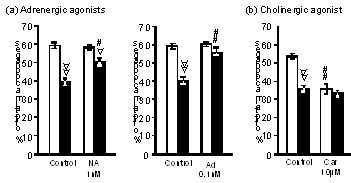Print version
Search Pub Med
The adrenergic agonists improve the impaired phagocytosis of alveolar macrophages in chronically stressed mice. Chronic stress has a negative influence on immunity and the autonomic nervous systems. Macrophages (Mφ s) are activated through the sympathetic nervous system (1). The specific alternation of rhythm in temperature (SART)-stressed mice which show various chronic stress symptoms is considered a model for autonomic imbalance (2). The aim of this study was to analyse the function of alveolar Mφ s from SART-stressed mice in relation to altered sympathetic function. Male ddY mice (n=8-13) were exposed repeatedly to cold stress for 7 days (SART stress)(2). The bronchoalveolar lavage fluid (BALF) in mice was obtained by washing the lung with phosphate-buffered saline under urethane (1.5 g/kg, i.p.) anesthesia. The alveolar Mφ s were obtained from the pellet following centrifugation of BALF. The phagocytic activity was measured by counting the Mφ s phagocytosing fluorescence microspheres. Adrenergic agonists, noradrenaline (NA; 1nM) and adrenaline (Ad; 0.1nM), and a cholinergic agonist, carbachol (Car; 10μM), were applied to the Mφ s. Phagocytic activity in SART-stressed mice significantly decreased in comparison with that in non-stressed mice (Fig.1). This was blocked by treatment with the adrenergic agonists (Fig.1a) in SART-stressed mice. However, Car had no such effects (Fig.1b). In summary, SART stress decreases the phagocytic activity of the alveolar Mφ s, which was improved by the adrenergic agonists. These results suggest that the impaired autonomic function, in particular sympathetic function, is involved in the stress-induced dysfunction of the alveolar Mφ s (1) Hanke ML, et al. (2012) Brain Behav Immun 26: 1150-1159. (2) Hata T, et al. (1983) Jpn J Psychosom Med 23: 61-68.
|


